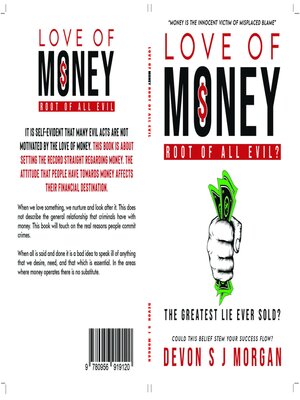
Sign up to save your library
With an OverDrive account, you can save your favorite libraries for at-a-glance information about availability. Find out more about OverDrive accounts.
Find this title in Libby, the library reading app by OverDrive.



Search for a digital library with this title
Title found at these libraries:
| Library Name | Distance |
|---|---|
| Loading... |
Love of Money: Root of All Evil?
Reclaiming the Truth About Our Most Misunderstood Tool
Is money the root of all evil-or have we misunderstood its role in our lives?
In this thought-provoking exploration, Love of Money: Root of All Evil? questions a widely held belief with clarity and logic: money, in itself, is neither good nor evil. It is an inanimate object, a neutral tool. It cannot compel actions, corrupt character, or cause harm. It simply reflects human intent.
The book traces the evolution of money from the barter system, highlighting how inefficient and restrictive barter was-especially as societies became more complex. While exchanging goods might meet basic needs, it couldn't support the growth of human experiences like travel, sports, entertainment, or innovation. Money emerged as a solution-an elegant, scalable system of exchange that enabled people to trade not only for essentials like food, clothing, and shelter, but for the diverse expressions of life itself.
Renowned speaker Jim Rohn once said, "We get paid for bringing value to the marketplace." In that sense, money directly reflects the value we offer others. Just as in the barter system-where someone might exchange a chicken for a tool-money is simply a more convenient and universal way to represent that value. It fosters growth, cooperation, and abundance.
So where does evil come in?
This book contends that the "love of money' only becomes a problem when individuals attribute unhealthy emotions, philosophies, or obsessions to it. When we deceive, exploit, or harm others in the pursuit of money, the fundamental issue isn't money itself-it's the mindset. Money simply amplifies what already exists within us. When used with integrity, it can be a force for good; if misused, it exposes our darker instincts.
Love of Money encourages readers to stop condemning money and start exploring the deeper truths behind human behaviour. Instead of blaming the tool, we must face how we choose to utilise it.







